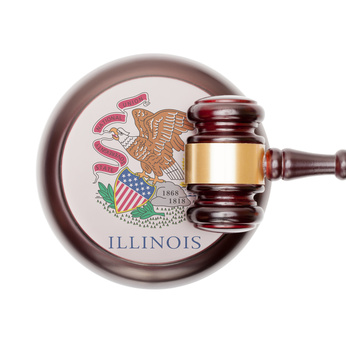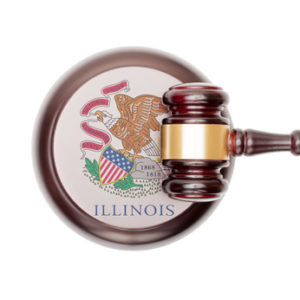The Illinois Appellate Court, First District, recently affirmed dismissal of the last of several post-judgment challenges to a default foreclosure judgment, holding that the borrower failed to present a sufficient record on appeal, failed to present sufficient evidence to vacate the default judgment, and also waived any objection to the jurisdiction of the trial court.
A copy of the opinion is available here: Link to Opinion.
In November 2011, a bank filed a complaint for foreclosure against the borrower for defaulting on his mortgage. The borrower was served in December 2011, but never answered. The bank filed a motion for default judgment of foreclosure and presented the motion to the trial court in May 2012.
The borrower appeared at the hearing on the motion for default judgment. The court granted the borrower’s request for 28 days to file his appearance and respond to the complaint for foreclosure. The bank withdrew its motion for default judgment.
Despite the extension of time, the borrower failed to answer or otherwise respond to the complaint. On the bank’s renewed motion, the trial court entered default judgment of foreclosure in July 2012—almost two months after the borrower should have responded.
After that, the borrower filed a series of post-judgment challenges to the default judgment and order approving the sale of the property.
In August 2012, he filed a motion to vacate the default judgment, but failed to cite any authority in support of his motion and it was denied.
The property was also sold at a judicial sale in October 2012. In November 2012, the borrower contested the order approving the sale, but after several continuances failed to appear at a March 2013 hearing to contest the order. The trial court entered an order approving the sale.
Still, in April 2013, the borrower filed a motion “to reconsider and vacate” the March 2013 confirming the sale. Later, in July 2013, the borrower withdrew that motion with leave to re-file. He never re-filed the motion. Instead he filed numerous pro se motions from July 2013 and March 2014.
Then, with a new attorney, he filed a petition to vacate the default judgment and order of sale in March 2014 where he made a number of ultimately meritless arguments. An emergency hearing was set in April 2014. It is unclear what transpired at the hearing because the borrower failed to provide a transcript or bystander’s report on appeal.
The trial court dismissed the petition in April 2014, just 15 days after it was filed. It held that the petition was procedurally improper. Substantively, the trial court held that the borrower’s lack-of-personal-jurisdiction argument (upon which his petition was based) lacked merit because he waived any objection to jurisdiction by participating in the original action without objecting. Also, substantively, the trial court held that the petition lacked merit because the borrower failed to present “new facts” that were “undiscoverable” at the time of the original action.
The borrower appealed, arguing the trial court’s sua sponte dismissal of his petition to vacate the default judgment violated a statutorily set 30-day period for the mortgagee to answer his petition. Therefore, he argued, the “sua sponte” dismissal was improper in light of the Illinois Supreme Court’s holding in People v. Laugharn, 233 Ill 2.d 318 (2009). On appeal, he also argued that his petition had merit and that the default foreclosure was void for lack of personal jurisdiction.
The Appellate Court disagreed with all of these arguments, and affirmed the trial court’s judgment.
The Court distinguished the borrower’s case from Laugharn. In Laugharn, a defendant filed a post-judgment petition to vacate a judgment, and nine days later the court dismissed it sua sponte. In that case, the Illinois Supreme Court reversed, and held that sua sponte dismissal of a post-judgment petition to vacate a judgment before the expiration of the 30-day period allowed under Illinois law was improper.
Here, the Appellate Court held that, unlike in Laugharn, there was no evidence that the trial court dismissed the petition sua sponte. Rather, the Appellate Court noted that the trial court apparently dismissed the petition following an appearance and argument from the respondent at the April 2014 hearing, which was within the 30-day period. The Appellate Court acknowledged that it was unclear who appeared at the hearing or what transpired at the hearing because there was no bystander’s report or transcript provided in the record on appeal other than the trial court’s written order and memorandum dismissing the petition.
Nevertheless, the Appellate Court held that it was the borrower’s burden as appellant to provide a transcript, bystander’s report, or some other record of what occurred at the April 2014 hearing. Yet, the memorandum and order dismissing the petition was the only document related to that hearing that was provided in the record.
Borrower Failed to Present Basis to Vacate Default Foreclosure Judgment
Accordingly, because the borrower failed to meet his burden to “provide a complete record,” the Appellate Court held that it “must presume” that the trial court properly considered the petition to vacate the default judgment and that the petition to vacate the default judgment was ripe for adjudication. Thus, the Appellate Court held that there was no evidence showing that the trial court dismissed the petition “sua sponte,” violated the 30-day rule or violated the holding in Laugharn.
Moreover, having held that the petition to vacate the default judgment was procedurally proper, the Appellate Court turned to the merits of that petition. As a preliminary matter, the court explained that the purpose of a petition to vacate default judgment in Illinois is to bring facts to the attention of the trial court which, if known at the time of judgment, would have precluded its entry.
The Appellate Court held that the borrower failed to provide sufficient evidence — or really any evidence — that would have precluded entry of default judgment at the time it was entered.
Moreover, the Appellate Court held that, even if he had presented some evidence, the borrower failed to argue in his petition or on appeal that he “was diligent in discovering and presenting his defenses to the trial court in the original action or in filing” his petition to vacate default judgment as required.
Finally, the Appellate Court held that the borrower’s argument that the foreclosure was void for lack of personal jurisdiction lacked merit. It held that because the borrower participated in the May 2012 hearing on the motion for default judgment, and did not object within 60 days to jurisdiction as required by 735 ILCS 5/15-1505.6, he waived any jurisdictional argument.
Consequently, for all of these reasons, the court affirmed the circuit court’s order dismissing the petition.



